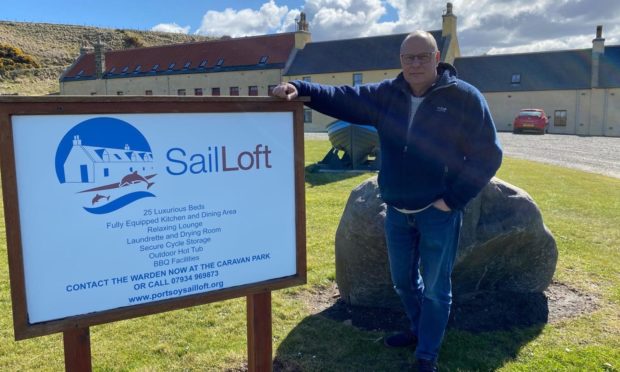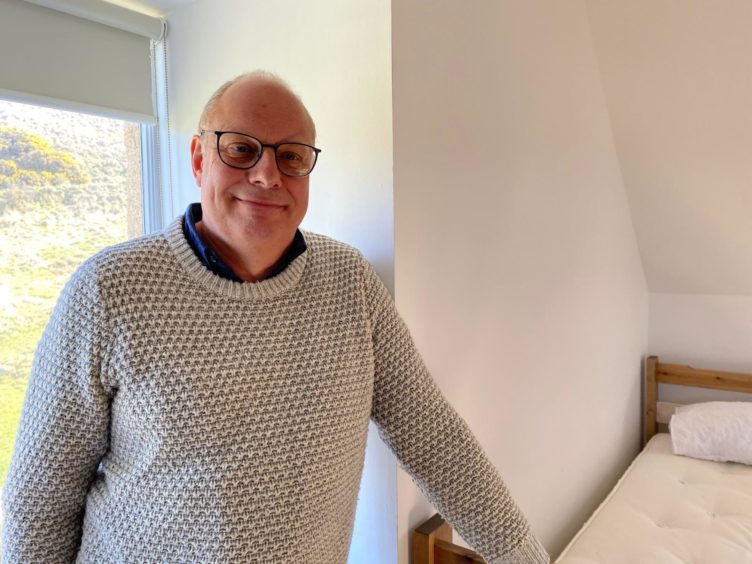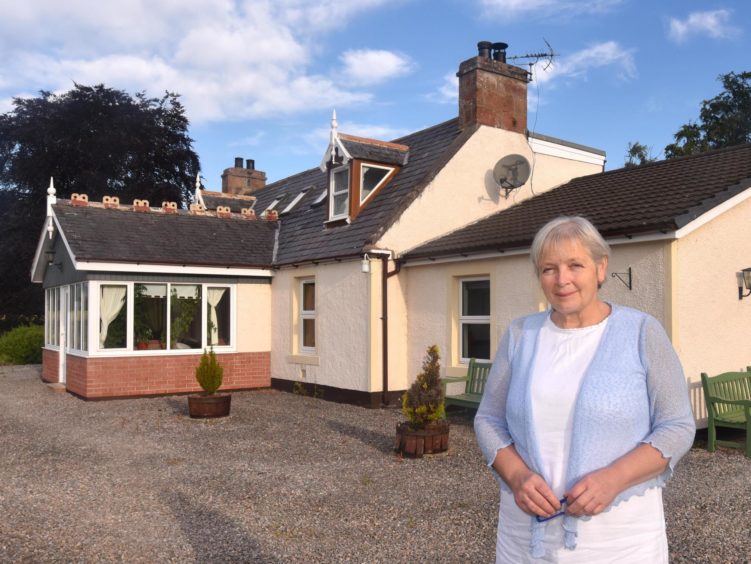The idea of sharing a bedroom with five strangers has become altogether alien during these socially distanced times.
But despite being faced with challenges to the very nature of their business, hostels across the north and north-east say they’re adapting in the hopes of attracting some business when they reopen from Monday.
Portsoy Community Enterprise is about to start a £25,000 refurbishment of its Sail Loft hostel to allow it to open its doors in a viable way this season.
The A-listed seafront building was bought by the group in 2006 and, following a £2 million renovation, opened as a 25-bed four-star hostel in 2017.
Under current health guidelines it was only able to operate at a fraction of its capacity, so is now being turned into three self-catering apartments with en-suite shower rooms.
It is hoped the move may help cater to a growing staycation trend.
Enterprise development manager Richard Thorne said: “By using two of the three rooms in a block as bedrooms and the third as a living-dining-kitchen area, this will enable fully self-contained apartment accommodation to be created that would be particularly attractive to families and small groups.
“The results of this work will make the Sail Loft more useable and beneficial to the local community which we are confident will convert into a higher local spend, community benefit and a significant increase in income from the Sail Loft.”
Meanwhile, Hostelling Scotland has postponed the opening of many of its 33 hostels, usually home to more than 340,000 guests every year and with a turnover of £9 million, until May 28.
Chief executive Margo Paterson said regulations are hitting the “very essence” of hostelling – with some hostels available from Monday on an exclusive use as “rent-a-hostel”.
Beyond the world of hostels, other accommodation providers are facing their own problems as a result of the restrictions.
Wynne Bentley, who owns Black Isle-based letting firm LHH Scotland, offers up holiday lettings from small one-bed cottages to 12-bed mansions and castles, across the north of Scotland and the islands.
She said the biggest challenge facing her, and the Balblair company’s five staff, is juggling those bookings needing constantly revised due to the guidance.
“It’s easy to manage the opening dates”, she said.
“It’s the conditions around those openings that are the challenge.
“We have customers who are postponing for next year or asking for a refund.
“It’s like moving pieces on a board game as we move people around from large houses to small ones, as we realise only certain numbers of people from a certain number of households can share a let.
“80% of bookings of our big houses are for extended families getting together for celebrations and even marriages. Until at least June, they can only meet in two households – so don’t need a huge home.
“On the other hand, we have seen more families going all out and hiring a mansion with a pool for a week as that amounts to what they might have spent travelling abroad for a holiday.”
Future remains uncertain
From Monday, self-catering accommodation can only be hired out for one household with no maximum limit.
From May 17, that should be increased to two households with a maximum of four adults and an unlimited number of children aged under 12.
It’s then anticipated that by the beginning of June those limits can increase to three households with a maximum of six adults.
“All our landlords are following the protocols, with enhanced cleaning, more sanitising equipment and the removal of certain ornaments as instructed,” Ms Bentley added.
“There’s anxieties on both sides, especially on the islands which are Covid-free.
“They rely on tourism and want to welcome visitors back, but they don’t want to see cases brought in. We are supportive of the lateral flow testing plans and equally they’ll do all they can from the cleaning protocol side of things.”
And while LHH Scotland’s 51 holiday homes in the north are booked solid from May to October, with all cancellations being snapped up within 24 hours so far, one particular group they’re struggling to cater for is the hillwalkers who enjoy the larger single-occupancy roomed homes in the Western Isles.
“While we are really excited to be reopening some of our doors, safety is priority so we are having to adapt our offering,” Ms Paterson said.
“The very essence of hostelling is about shared spaces and meeting people, so we are having to make adjustments across the whole sector.”
“The warm welcome will still be there”
However, even with the Scrabble boards and books removed and rooms restricted to one household, Scotland’s hostels are still expected to be really busy this summer.
“We really believe we will meet the demands on the staycation market,” Ms Paterson added.
“The warm welcome we will give our guests will still be there. We live in such a beautiful country and the uniqueness or the conditions won’t have changes, it’s more the offerings that have.
“People know things will be different but still want to come stay in a hostel.
“They still want to get out walking in rural areas. Our challenge, though, will be financial because of the impact our reduced bed spaces will have on revenue.
“It restricts choice for guests therefore restricts our ability generate revenue. It could be we need more money from the Scottish Government but we are positive about the future.
“We’ve had to look at minimising touch points without losing the welcoming feel.
“There’s nothing better than a good game of Scrabble in a hostel on a cold, dark night.”
Predictions of a strong tourist season
Andrew Martin, a lecturer in international tourism and hospitality management at Aberdeen’s Robert Gordon University, believes operators are in for a “positive summer” when it comes to hiring out cottages to families.
“There’s a pent-up demand and there will be a lot of people coming to Scotland for staycations,” Mr Martin said.
“I am predicting a really strong summer for Scotland.
“I think self-catering cottages, where you can stay in your family bubble, is as safe as you are going to get.
“It’s an excellent opportunity and it does feel like we need to crack on and get opening up tourism.
“There is a demand and there are going to be good yields for operators.
“However, there has got to be a degree or safety precautions as well and with enhanced cleaning and such the industry is well place to welcome guests.”
Mr Martin warned that the move from hotels to self-catering as a top choice for holidaymakers will come at a cost.
“Businesses have adapted with many moving to self-catering as that’s where the demand is,” he added.
“We are seeing in the city and shire, premises that were operating as quasi-hotels adapting into self-catering. But the yield is significantly less and that’s disappointing.
“It’s typically a lower spend then so the economic contribution to the city and shire is less.
“With that said, we mustn’t forget about the hotels and they are well equipped to offer safe holidays too.”
Ash Varangu, of Portree-based Islands and Highlands Lettings, added: “Many people are feeling safer sticking closer to home and being able to enjoy a drive to the Highlands, rather than jumping on an international flight.
“Lockdown and travel unease definitely increased demand for last autumn and we expect something similar will happen this year.
“We hope the initial easing of restrictions is a smooth one and the Scottish Government’s re-opening dates follow suit. This will help to ease the impact the restrictions have had on our larger properties that are more suited to groups of friends and extended families meeting up.”












